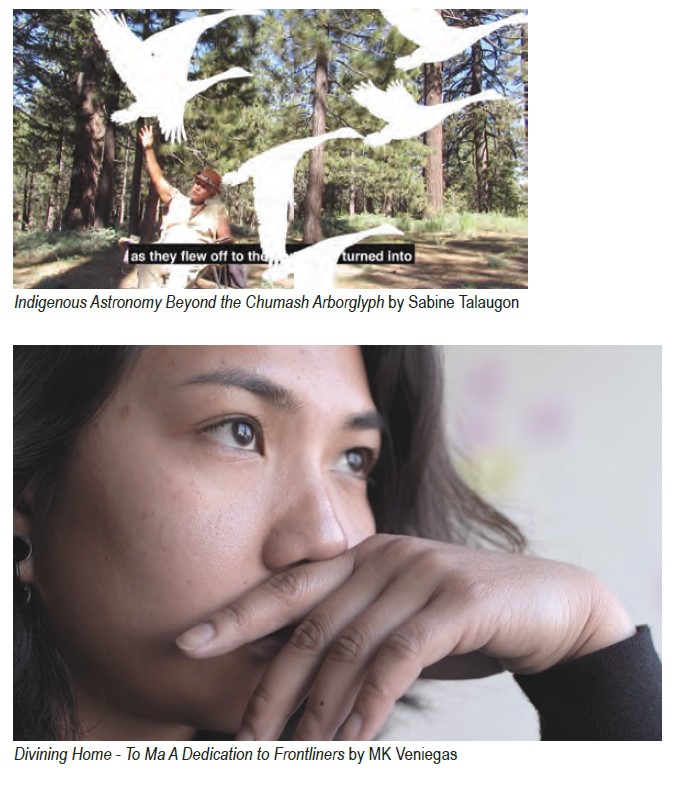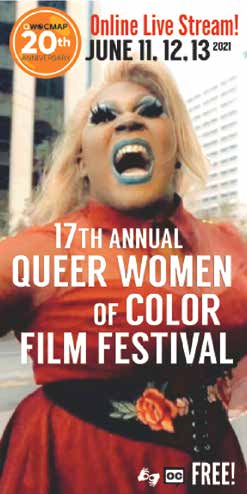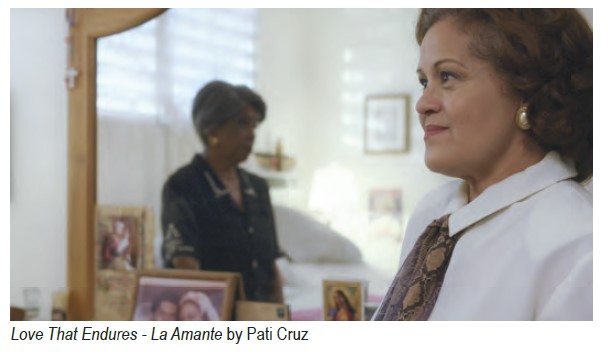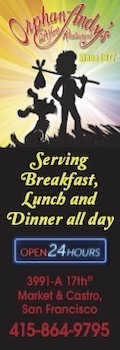‘Molten Connections’ Make for Merry Community at the 17th Annual Queer Women of Color Film Festival

There are connections so profound, so molten that they alter our very understanding of the world, and move us all to act.
In its 17-year history, the free, annual international Queer Women of Color Film Festival has always focused on the core issues that fracture our daily lives. It empowers the creativity and leadership of LBTQIA+ Black/African descent, Native American/American Indian, Native Hawaiian & Pacific Islander, First Nations/Indigenous, Asian, South Asian, Southwest Asian, North African, Arab & Muslim, and Latinx—including AfroLatinx and Indígena—(BIPOC) filmmakers and audiences from around the world. It layers joy and compassion across fissures caused by bigotry. And it solidifies safety, welcome, and belonging for these communities with plenty of humor.
Presented by Queer Women of Color Media Arts Project (QWOCMAP), the Film Festival screens June 11–13. It is accessible around the world and completely free to all. Screenings have open captions/subtitles for the Deaf & Hard-of-Hearing, and CART/live captions and ASL interpreters.
Among films from Germany, Colombia, and Canada, the Film Festival features BIPOC filmmakers from the U.S. and the San Francisco Bay Area.
Opening Night begins with the film Indigenous Astronomy: Beyond the Chumash Arborglyph. The documentary offers a glittering glimpse into astronomy and provides crucial context for important cultural days in contemporary practice. Elders connect ancient rock paintings, carvings to map Native American science and technology, in the traditional unceded territory of the Chumash and Tataviam people, which is in and around Los Angeles. Director Sabine Talaugon’s Chumash identity anchors the film’s content and aesthetic. Sabine is also an Alum of QWOCMAP’s award-winning Filmmaker Training Program, which is grounded in the queer feminism of color ethics of equipping communities to tell their own stories.

The Centerpiece Screening includes La Amante by Pati Cruz, a beautiful short about two queer Puerto Rican elders, one an AfroBoricua mother, who reopen a geode of love. The Film Festival offers assistance with technology to elder cisgender and transgender women of color. Community Partners for this screening include Old Lesbians Organizing for Change, Openhouse, and Lavender Seniors of the East Bay. They are among the 30+ organizations this year that helped to produce the Film Festival, making it a true community event.
Additional festival highlights include just and representative films, because how the world seesus affects how it treats us. To Ma: A Dedication to Frontliners by MK Veniegas dives into the COVID-19 pandemic, the Black Lives Matter movement, and the struggles of frontline workers. The documentary exposes the edges of social justice issues that concern BIPOC communities. LBTQIA+ people of color are still disproportionally affected by the pandemic, as well as police violence against Black, Brown, and Sick & Disabled people, and anti-Asian violence.
Closing Night world premieres We Make This City,a brand-new documentary by San Francisco-based filmmaker Narissa Lee, another QWOCMAP Alum. Weaving interviews with local Bay Area artists and activists, this film glows with the stories, spaces, and histories that are the bedrock of San Francisco, despite gentrification and displacement.

QWOCMAP supports filmmakers like Lee, who has served as a Film Mentor for its award-winning Filmmaker Training Program. The organization also supports LBTQIA+ people of color filmmakers through employment in QWOCMAP Productions, its Filmmaker Grant, and its 20-year-old boutique Film Distribution Program. With its catalog of 452 LBTQIA+ BIPOC films, it’s one of few such distributors in the world.
According to Yvonne Welbon, award-winning filmmaker, producer, and QWOCMAP Advisory Board member, QWOCMAP is directly responsible for 50% of the queer Black women working in film today.
QWOCMAP has always been grounded in care, respect, and community. Founded over 20 years ago by Madeleine Lim, an immigrant queer Asian woman, QWOCMAP is the first film and media arts organization in the world by, for, and about LBTQIA+ people of color. Instead of buzzwords, justice and equity sculpt all of QWOCMAP’s every day practices.
The Film Festival has always been free because of QWOCMAP’s commitment to economic justice. Attendees aren’t forced to pick and choose which films they can afford to see. As a result, the Film Festival is buttressed by loyal audiences that are the “most diverse of any arts event in the Bay Area.” Over the years, it has been hailed as the “platinum standard for disability access.” Last year, it quickly adapted to the turbulence of the pandemic and moved its Film Festival completely online. Without changing its dates since the Film Festival first began in 2005 (held 2 weekends before Pride Sunday), it live-streamed to 3000 households around the world.

With the Festival Focus “Molten Connections,” this year’s 17th annual event forges deep relationships, cements bonds across diasporas, and sparkles with a multi-faceted love that withstands time.
To register for a FREE ticket, visit https://festival2021.qwocmap.org/
Published on June 10, 2021








Recent Comments